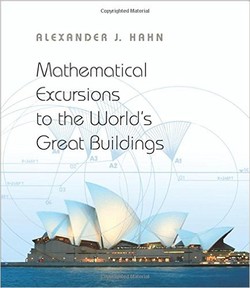کتاب “گشتوگذاری به سبک ریاضی در ساختمانهای بزرگ جهان” خوانندگان را در یک سفر روشنگرانه از درک ریاضیات موجود در پشتصحنه بعضی از دیدنیترین ساختمانهای دنیا همراهی میکند. ساختمانهای بزرگی همچون اهرامها، پارتنون (معبد خدای آتنا در آتن)، خانه اپرا سیدنی و موزه گوگنهایم بیلبائو.
این کتاب نقاط عطف موجود در ریاضیات مقدماتی را که به درک این ساختمانها روح بخشیدهاند، بررسی میکند و این درک را با یک نگاه عمیق بر هنر، تاریخ و ساختار آن ساختمانها ترکیب میکند. این کتاب با استفاده از مثلثات و بردار شرح میدهد که چگونه قوس گوتیک ساختاری برتر نسبت به قوس رومی دارد. یا نشان میدهد که چگونه خطکشی ساده و ساختوسازهای مدور میتواند جزئیات پیچیده معماری را تولید کنند.
نویسنده این کتاب Alexander Hahn، نقاط تقاطع میان ریاضیات مقدماتی و معماری را شرح میدهد.
Hahn از زمانهای ماقبل تاریخ آغاز میکند و تمام سبکهای مختلف یونانی، رومی، اسلامی، گوتیک، رنسانس و در نهایت سبکهای مدرن را بررسی میکند.
سرتاسر کتاب به زیبایی به تصویر کشیده شده و مملو از جزئیات مفید است. و درک عمیقی از نقش ریاضی در اجرای ظریفترین ساختمانهای دنیا برای خوانندگان ایجاد میکند.
این کتاب نقاط عطف موجود در ریاضیات مقدماتی را که به درک این ساختمانها روح بخشیدهاند، بررسی میکند و این درک را با یک نگاه عمیق بر هنر، تاریخ و ساختار آن ساختمانها ترکیب میکند. این کتاب با استفاده از مثلثات و بردار شرح میدهد که چگونه قوس گوتیک ساختاری برتر نسبت به قوس رومی دارد. یا نشان میدهد که چگونه خطکشی ساده و ساختوسازهای مدور میتواند جزئیات پیچیده معماری را تولید کنند.
نویسنده این کتاب Alexander Hahn، نقاط تقاطع میان ریاضیات مقدماتی و معماری را شرح میدهد.
Hahn از زمانهای ماقبل تاریخ آغاز میکند و تمام سبکهای مختلف یونانی، رومی، اسلامی، گوتیک، رنسانس و در نهایت سبکهای مدرن را بررسی میکند.
سرتاسر کتاب به زیبایی به تصویر کشیده شده و مملو از جزئیات مفید است. و درک عمیقی از نقش ریاضی در اجرای ظریفترین ساختمانهای دنیا برای خوانندگان ایجاد میکند.
سال انتشار: 2012 | تعداد صفحات: 352 | حجم فایل: 24.31 مگابایت | زبان: انگلیسی
Mathematical Excursions to the World’s Great Buildings
نویسنده:
Alexander J. Hahn
ناشر:
Princeton University Press
ISBN10:
0691145202
ISBN13:
9780691145204































